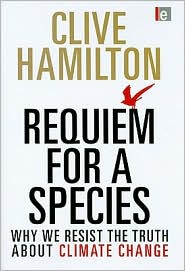Requiem for a Species: Difference between revisions
m →Themes |
→Themes: expand |
||
| Line 25: | Line 25: | ||
Hamilton makes his argument in three stages. Firstly, he reviews the evidence about how serious the situation is already and how much worse it will get. Secondly, he examines the roots of our denial, both in terms of our resistance to the evidence and in relation to the actors and agencies motivated to deny climate change. Lastly, he looks at some future scenarios and reflects on what people should do.<ref name=sy>{{cite news |author=Yearley, Steven |title=Book of the week: Requiem for a Species |url=http://www.timeshighereducation.co.uk/story.asp?storycode=411928 |publisher=Times Higher Education |date=3 June 2010 }}</ref> |
Hamilton makes his argument in three stages. Firstly, he reviews the evidence about how serious the situation is already and how much worse it will get. Secondly, he examines the roots of our denial, both in terms of our resistance to the evidence and in relation to the actors and agencies motivated to deny climate change. Lastly, he looks at some future scenarios and reflects on what people should do.<ref name=sy>{{cite news |author=Yearley, Steven |title=Book of the week: Requiem for a Species |url=http://www.timeshighereducation.co.uk/story.asp?storycode=411928 |publisher=Times Higher Education |date=3 June 2010 }}</ref> |
||
Hamilton suggests that the roots of climate change denial lie in the reaction of American conservatism to the collapse of the Soviet Union in 1991. He argues that as the "red menace" receded, conservatives who had put energy into opposing communism sought other outlets. Hamilton contends that the conservative backlash against climate science was led by three prominent physicists -- [[Frederick Seitz]], [[Robert Jastrow]], and [[William Nierenberg]].<ref>{{harvnb|Hamilton|2010|pp=98-101}}</ref> |
|||
==Reception== |
==Reception== |
||
Revision as of 07:40, 4 December 2010
 | |
| Author | Clive Hamilton |
|---|---|
| Subject | Climatic changes—Social aspects Global warming—Social aspects Twenty-first century—Forecasts |
| Publisher | Earthscan |
Publication date | 2010 |
| Pages | 286 pp. |
| ISBN | 9781849710817 |
| OCLC | 489636734 |
| 363.738 | |
| LC Class | QC903 .H2185 2010 |
Requiem for a Species: Why We Resist the Truth about Climate Change is a 2010 book by Clive Hamilton which explores climate change denial and its implications. Hamilton has written about climate change for 15 years, and contends that the "world is on a path to a very unpleasant future and it is too late to stop it".[1] Hamilton argues that to believe anything else is to deny the climate change truth and engage in wishful thinking, yet people continue to resist the truth about climate change.[2]
Themes
Hamilton points out that there have been many books and reports over the years explaining the climate change problem and just how ominous the future looks for humanity. He says Requiem for a Species is about why we have ignored those warnings.[3]
Hamilton considers that sometimes an inconvenient truth may be too difficult to bear:
Sometimes facing up to the truth is just too hard. When the facts are distressing it is easier to reframe or ignore them. Around the world only a few have truly faced up to the facts about global warming... It's the same with our own deaths; we all "accept" that we will die, but it is only when our death is imminent that we confront the true meaning of our mortality. [4]
The most immediate reason for the failure to act on global warming is seen to be the "sustained and often ruthless exercise of political power by the corporations who stand to lose from a shift to low- and zero-carbon energy systems". Hamilton suggests that the story of the influence of large companies such as ExxonMobil, Rio Tinto Group and General Motors has been told by a number of journalists and authors.[5]
Hamilton makes his argument in three stages. Firstly, he reviews the evidence about how serious the situation is already and how much worse it will get. Secondly, he examines the roots of our denial, both in terms of our resistance to the evidence and in relation to the actors and agencies motivated to deny climate change. Lastly, he looks at some future scenarios and reflects on what people should do.[2]
Hamilton suggests that the roots of climate change denial lie in the reaction of American conservatism to the collapse of the Soviet Union in 1991. He argues that as the "red menace" receded, conservatives who had put energy into opposing communism sought other outlets. Hamilton contends that the conservative backlash against climate science was led by three prominent physicists -- Frederick Seitz, Robert Jastrow, and William Nierenberg.[6]
Reception
Requiem for a Species was "Book of the week" in the Times Higher Education supplement on 3 June 2010.[2] An extract of the book appeared in The Guardian on 16 April 2010.[7]
Author
Clive Hamilton is professor of public ethics at the Australian Centre for Applied Philosophy and Public Ethics (CAPPE). Before joining CAPPE, he was executive director and founder of The Australia Institute, a progressive think tank.[2]
See also
- An Inconvenient Truth
- Storms of my Grandchildren
- Climate Code Red: The Case for Emergency Action
- Scorcher: The Dirty Politics of Climate Change
- Merchants of Doubt
References
- ^ Munro, Kelsey (February 27, 2010). "Too late for all but prayers". The Sydney Morning Herald.
- ^ a b c d Yearley, Steven (3 June 2010). "Book of the week: Requiem for a Species". Times Higher Education.
- ^ Hamilton 2010, p. x
- ^ Hamilton 2010, p. viii
- ^ Hamilton 2010, p. xiv
- ^ Hamilton 2010, pp. 98–101
- ^ Hamilton, Clive (16 April 2010). "Extract: Requiem for a Species". The Guardian.
External Links
Hamilton, Clive (2010). Requiem for a Species: Why We Resist the Truth about Climate Change. Earthscan. ISBN 9781849710817. {{cite book}}: Invalid |ref=harv (help)
